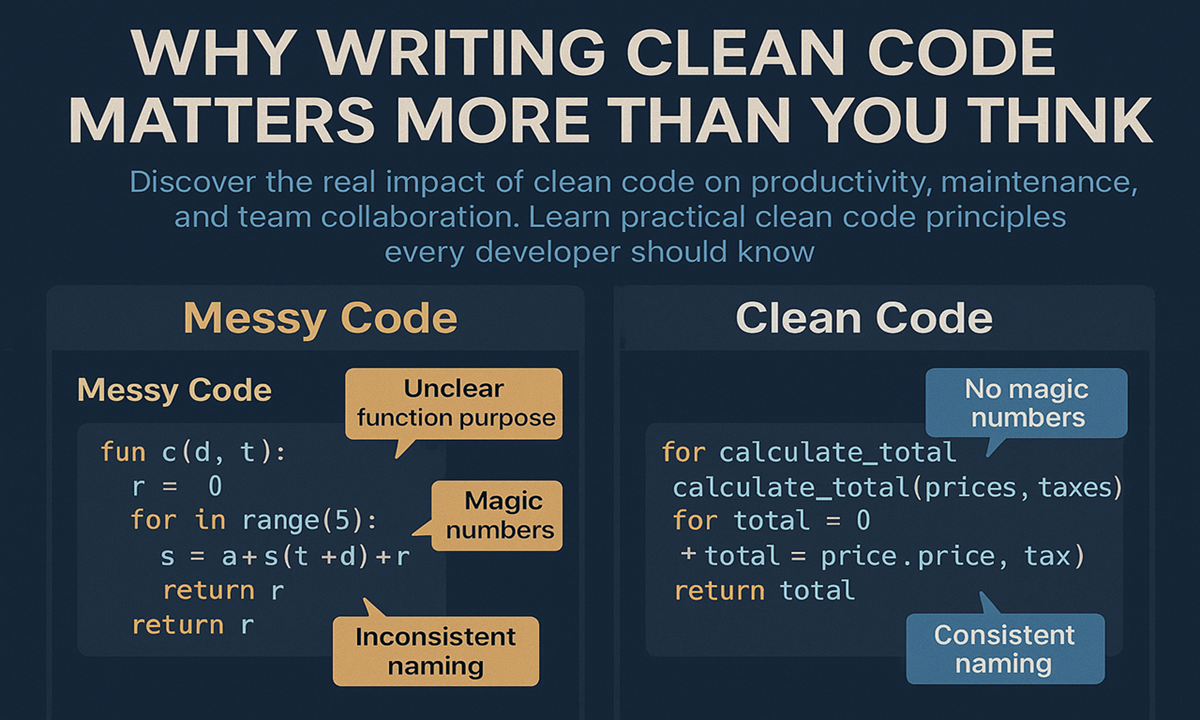The Hidden Costs of Messy Code
We've all encountered it - that tangled web of code that makes you sigh just looking at it. What many developers don't realize is that messy code carries significant hidden costs. For every hour spent writing quick-and-dirty code, teams often spend 10 hours later trying to understand, debug, or modify it. Clean code isn't just about aesthetics; it's a fundamental professional responsibility.
What Exactly Is Clean Code?
Clean code is code that is:
- Readable: Easily understood by other developers (including your future self)
- Maintainable: Simple to modify and extend
- Efficient: Performs well without unnecessary complexity
- Testable: Designed to be easily verified for correctness
Robert C. Martin's Definition
"Clean code reads like well-written prose. It's simple and direct. Clean code never obscures the designer's intent but rather is full of crisp abstractions and straightforward lines of control."
The Business Impact of Clean Code
1. Reduced Maintenance Costs
Studies show maintenance typically consumes 40-80% of total software costs. Clean code can dramatically reduce this by making changes faster and less risky.
2. Faster Onboarding
New team members can become productive up to 50% faster when working with clean, well-organized codebases.
3. Fewer Bugs
Clean code practices like single responsibility principle and proper testing can reduce defect rates by 30-50%.
4. Better Team Morale
Developers are happier and more productive when they work with clean code rather than fighting through spaghetti logic.
Practical Clean Code Principles
1. Meaningful Naming
Variables, functions, and classes should reveal their intent:
# Bad
def proc(d, t):
# What does this do?
pass
# Good
def calculate_discount(total_price, threshold):
# Clearly describes purpose
pass2. Small Functions
Functions should do one thing and do it well. A good rule of thumb: if you can't describe what a function does without using "and", it's probably doing too much.
3. Avoid Comments When Possible
Comments often compensate for poorly written code. Instead:
# Bad
# Check if user is eligible for discount
if u.age > 65 and u.status == 'active' and u.orders > 5:
# apply discount
pass
# Good
def is_eligible_for_senior_discount(user):
return (user.age > SENIOR_AGE and
user.is_active() and
user.has_minimum_orders(MIN_ORDERS))4. Consistent Style
Follow style guides (PEP 8 for Python, Google Style for Java, etc.) and use linters to enforce consistency.
The Long-Term Perspective
Consider these statistics about code lifespan:
- The average enterprise application lasts 5-10 years
- Only 15-20% of time is spent writing new code
- Most professional developers work primarily on existing codebases
Given these realities, writing clean code isn't just "nice to have" - it's essential for sustainable software development.
Getting Started with Clean Code
- Start small: Refactor one messy function each day
- Learn the SOLID principles: Single responsibility, Open-closed, etc.
- Use code reviews: Peer feedback improves code quality
- Read great code: Study well-maintained open source projects
Conclusion: Clean Code is Professionalism
Writing clean code isn't about perfectionism - it's about professionalism. It's the difference between being a coder and being a software engineer. The few extra minutes you spend writing clean code today will save hours (or days) of frustration tomorrow.
Remember: Always code as if the person who ends up maintaining your code is a violent psychopath who knows where you live.
Want to improve your clean code skills? Pick one principle to focus on this week and share your experience in the comments!
